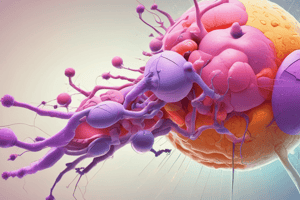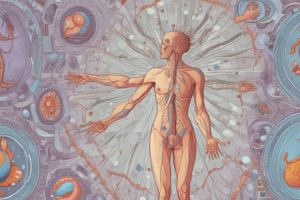Podcast
Questions and Answers
What is the primary function of the immune system?
What is the primary function of the immune system?
- To distinguish between self and foreign substances (correct)
- To produce cytokines
- To destroy abnormal or dead cells
- To produce antibodies
Which of the following is NOT a type of immune response?
Which of the following is NOT a type of immune response?
- Innate immunity
- Homeostasis (correct)
- Adaptive immunity
- Active immunity
What is the role of the spleen in the immune system?
What is the role of the spleen in the immune system?
- To destroy abnormal or dead cells
- To produce antibodies
- To produce cytokines
- To filter out foreign substances from the blood (correct)
What type of cells are responsible for killing invaders in the immune system?
What type of cells are responsible for killing invaders in the immune system?
What is the term for the collective and coordinated response to the introduction of foreign substances in an individual?
What is the term for the collective and coordinated response to the introduction of foreign substances in an individual?
What is the main difference between innate and adaptive immunity?
What is the main difference between innate and adaptive immunity?
Which of the following is NOT a type of innate immune mechanism?
Which of the following is NOT a type of innate immune mechanism?
What is the primary function of lysozymes in the innate immune response?
What is the primary function of lysozymes in the innate immune response?
What is the role of natural killer cells in the innate immune response?
What is the role of natural killer cells in the innate immune response?
What is the key feature of adaptive immunity that is not present in innate immunity?
What is the key feature of adaptive immunity that is not present in innate immunity?
Flashcards are hidden until you start studying
Study Notes
The immune system consists of cells, tissues, and molecules that provide resistance to infections, with the role of defending against microbes, tumor cells, and maintaining homeostasis. It is composed of organs (e.g., tonsils, thymus, lymph nodes) and cells (e.g., T-lymphocytes, B-lymphocytes, natural killer lymphocytes) that work together to provide immunity. There are two types of immunity: innate immunity, which provides immediate defense, and adaptive immunity, which adapts to infections and is mediated by T- and B-lymphocytes.
Studying That Suits You
Use AI to generate personalized quizzes and flashcards to suit your learning preferences.




